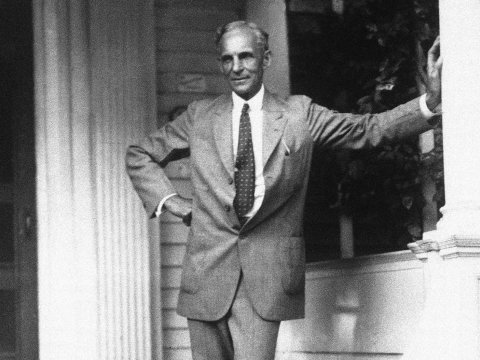Franchising, retail, business

18/06/2014
In 1908, a young journalist named Napoleon Hill met with the industrialist Andrew Carnegie, one of the richest men to ever live, to discuss how he became so successful.
Carnegie liked Hill so much that he decided to share his core values and strategies, which launched Hill's career as a pioneer of the self-help genre.
His 1937 book "Think and Grow Rich" went on to become one of the bestselling books of all time. Hill based his insights on the lives of legendary businessmen of the early 20th century, like Thomas Edison and Henry Ford.
Here are the 11 traits that Hill found all successful leaders share:
1. They have unwavering courage based on self-confidence.
When leaders have a vision they believe in and know that they are capable of realizing it, others will believe in them, too.
2. They have self-control.
Strong leaders need to be able to control themselves if they're going to be able to control others. This means refraining from overreacting to something either positive or negative, which can give people a bad impression.
3. They are fair.
"Without a sense of fairness and justice, no leader can command and retain the respect of his followers," Hill writes.
4. They don't wait for perfect answers to make a decision.
Great leaders practice what Hill calls "definiteness of decision." This means that they do not defer making a decision until they find a "perfect" answer or reach full consensus. They can't be afraid of risk or criticism.
5. They work by a plan.
Hill said that successful leaders never operate on guesswork, and that a resolute leader can trump someone who is naturally more talented. "Henry Ford accumulated a fortune, not because of his superior mind, but because he adopted and followed a plan which proved to be sound," he writes.
6. They do more than what is required.
The best leaders attain a position of power because they outperformed their competition. And if they're at the top of their field, they maintain greatness by outperforming themselves.
7. They are exceptionally likable.
In his essay "Develop A Pleasing Personality," Hill explains that it was steel magnate Charles M. Schwab's charming demeanor that made him so much money. His boss, Andrew Carnegie, told Hill that he gave Schwab a regular million-dollar bonus (a tremendous amount of money in the late 19th century) not for the work he did, but for the work he used his pleasing personality to get others to do.
8. They are sympathetic.
Successful leaders understand the personalities and problems of their team members. Hill says it's not a coincidence that history is filled with kings and dictators being overthrown, since "people will not follow forced leadership indefinitely."
9. They pay attention to detail.
The best leaders set themselves apart by giving every part of their job their full effort, no matter how small it may be. If a lack of attention leads to regular tiny mistakes, their accumulation can become linked with reputation.
10. They assume full responsibility for their team.
"The successful leader must be willing to assume responsibility for the mistakes and the shortcomings of his followers," Hill writes. The best leaders do not look for excuses to blame others or situations for failures that happened under their watch.
11. They are cooperative.
"Leadership calls for power, and power calls for cooperation," Hill says. The best leaders recognize that by themselves they cannot handle every challenge that comes their way, and instead build a team that they can work with, rather than make demands of.
By: businessinsider.com